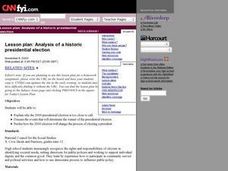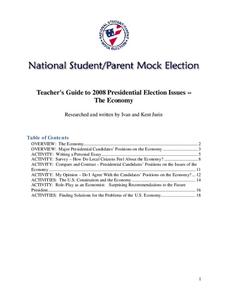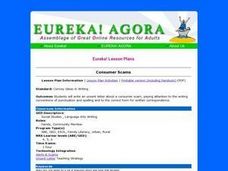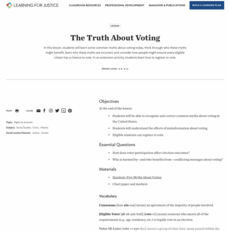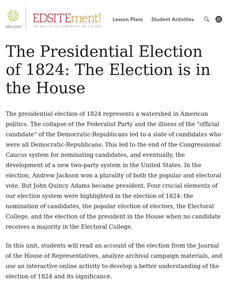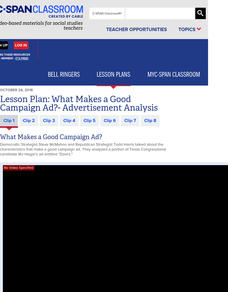Curated OER
Analysis of a Historic Presidential Election
Learners research the 2000 presidential elections. They explain why the presidential winner was initially too close to call, discuss how the winner was determined and predict how the 2000 election might change the process of electing a...
Curated OER
Presidential Election One Year Away
Students identify political parties, then read a news article about the 2008 election. In this current events lesson (written prior to the 2008 election), the teacher introduces the article with a discussion and vocabulary activity, then...
Constitutional Rights Foundation
270 Votes to Win: The Electoral College in the United States
What exactly is the Electoral College and how does it work? The lesson is part of a larger series on government that explains what the Electoral College is and how it helps determine an election winner. Academics participate in...
Curated OER
Teacher's Guide to 2008 Presidential Election Issues: The Economy
Learners discuss the 2008 Presidential election. They examine the significant issues of the election and focus on the economy. Students study the major issues with the economy. Learners decide how they feel about each canidates' views...
Curated OER
Convey Ideas in Writing
Use the platforms of the 2004 presidential candidates to bring persuasive writing to your class. Young voters identify the three issues most important to them in the election and research the issues and candidates' positions. They write...
Encyclopedia Britannica
Candidate Position Research
As part of their study of the US Presidential election process, class members research a presidential candidate's position on a specific topic or topics. Formatting their research as a pro/con question ("Should the Death Penalty Be...
Encyclopedia Britannica
Electoral College Philosophical Chairs Debate
Because of the Electoral College, it is possible to win the popular vote in a US Presidential election and still lose the election. After researching the pros and cons of the Electoral College, class members engage in a structured debate...
Teaching Tolerance
The Truth About Voting
True or False: Only Presidential elections matter. Academics delve into common voting myths to understand what is true and why the election process is critical to democracy. The lesson uses group discussion, activities, and handouts to...
Encyclopedia Britannica
Candidate Position History Research
Climate change. Assault weapons ban. Death penalty. And the list goes on. So many issues are part of a US presidential election that it can be hard to determine a candidate's position on a particular topic and whether their position has...
Encyclopedia Britannica
Political Issue Timeline
As part of a study of US Presidential elections, class members track the history of an issue in the 2020 campaign. They create a timeline to determine if there are any patterns, if ideas about the issue have evolved, or if in issue is no...
Curated OER
The Election Is in the House: The Presidential Election of 1824
Students read an account of the election from the Journal of the House of Representatives, analyze archival campaign materials, and use an interactive online activity to develop a better understanding of the election of 1824 and its...
C-SPAN
What Makes a Good Campaign Ad?- Advertisement Analysis
In the time of a hotly contested presidential election, campaign ads are almost ubiquitous—but what makes them good? Using ads from the 2018 midterm elections, learners consider the various strategies candidates use to get the vote....
Museum of the Moving Image
Evaluating Information: Focus on the 2008 Election
Just how true is the information contained in political ads? Determining the veracity of campaign ads from the 2008 presidential race is the focus of a lesson that introduces class members to several fact-checking resources.
Curated OER
Campaign Trailblazers
Explore the backgrounds, qualifications, and platforms of the presidential candidates for the 2000 election. Though the lesson is outdated, the activities within the informational text could be good practice for your young learners as...
Heritage Foundation
The Office of the Executive
An executive is not just a leader of a company; you can also use the term to describe the president of the United States. The ninth part of a 20-part unit teaches high schoolers about the importance of the executive branch and the...
Curated OER
The Election of Barack Obama 44th President of the United States
Students consider the historic implications of Barack Obama's election. In this election of 2008 lesson, students research Obama's accomplishments and determine how his election signifies the success of the American Civil Rights...
PBS
Analyzing the Candidates in the 2008 Presidential Election
High schoolers research the 2008 presidential candidates and the required process for becoming an American presidential candidate. The class discusses both the process and the candidates, and some of the reasons someone might want to run...
Curated OER
Presidential Election 2008:Making Decisions about Political Candidates
Learners think critically about political candidates. In this election lesson, students research candidates and use information sources to explore their stands on issues.
Curated OER
The Class Party
Young scholars take a closer look at presidential elections. In this Electoral College lesson, students participate in a classroom simulation that requires them to form a political party that puts forth a candidate to run for election.
NYC Department of Records
Citizenship and Elections: The Importance of a Ballot
Approximately 58 prcent of those eligible voted in the 2016 US Presidential election. In an attempt to impress upon learners the importance of voting and voting rights, class members examine primary source documents related to...
Classroom Law Project
What should I watch for in the debates?
Prepare your classes for election year debates with a series of activities that model how to watch televised debates and how to evaluate the moderators as well as the debaters.
Curated OER
Funding a Way to the Top
Review economic vocabulary, presidential election campaigns, and current campaign budgets (2004). Your class will determine how they feel about the amount of money spent on presidential campaigns, they will read an informational article,...
Encyclopedia Britannica
Presidential Electability
There are specific constitutional requirements that candidates must meet to become president of the United States. In addition, there are societal opinions that affect a candidate's electability. Class members examine historical...
Curated OER
POWER OF VOTING
Fifth graders explain the process of a national presidential election by researching through the Internet and holding an election simulation. They collect, graph, and interpret election data. They enhance their computer skills by...
Other popular searches
- 2008 Presidential Elections
- Presidential Elections 1824
- 2io8 Presidential Elections
- 2oo8 Presidential Elections
- Presidential Elections of 08
- U.s. Presidential Elections
- Us Presidential Elections


